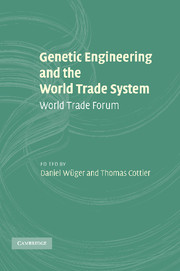Book contents
- Frontmatter
- Contents
- List of contributors
- List of abbreviations
- PART I Introduction and systemic issues
- PART II Intellectual property and gene technology: issues at stake and possible options
- 4 Biotechnology and patents: global standards, European approaches and national accents
- 5 Intellectual property rights, biotechnology and development: African perspectives
- 6 Traditional knowledge, biogenetic resources, genetic engineering and intellectual property rights
- PART III Food security, trade and agricultural production with genetically modified organisms
- PART IV Food safety, international trade and biotechnology
- PART V Medical research, cloning and international trade
- Index
5 - Intellectual property rights, biotechnology and development: African perspectives
Published online by Cambridge University Press: 06 October 2009
- Frontmatter
- Contents
- List of contributors
- List of abbreviations
- PART I Introduction and systemic issues
- PART II Intellectual property and gene technology: issues at stake and possible options
- 4 Biotechnology and patents: global standards, European approaches and national accents
- 5 Intellectual property rights, biotechnology and development: African perspectives
- 6 Traditional knowledge, biogenetic resources, genetic engineering and intellectual property rights
- PART III Food security, trade and agricultural production with genetically modified organisms
- PART IV Food safety, international trade and biotechnology
- PART V Medical research, cloning and international trade
- Index
Summary
Africa lags significantly behind in technological advancement, including in the areas of agricultural biotechnology and food production. Also, the uptake and development of technologies to prevent and treat major diseases, such as malaria, has been extremely slow. The agricultural systems of most of the developing world had a Green Revolution surge in crop yields in the 1970s–1990s as a result of scientific breeding methods that produced high-yield varieties combined with increased use of fertilisers and irrigation. Africa's uptake of high-yield varieties was the lowest in the developing world. Against this background, some have argued that Africa needs to embrace the biotechnology revolution, especially genetically modified crops, to feed its population. There have been some successes in plant biotechnology in Africa, including the development and commercial production of Bt crops (Bollgard cotton and YieldGard maize) in South Africa, and the development of new rice varieties dubbed NERICA (NEw RIce for AfriCA) at the Africa Rice Centre (WARDA) in West Africa – an intergovernmental research organisation comprising seventeen West African countries. Despite these developments, the performance of plant biotechnology in Africa remains poor. The principal cause is the persistent minimal investment in agricultural research and development by the governments of most African countries. Also, many indigenous food crops that feed a large percentage of the African population are of little commercial interest to the multinational companies that invest in research and development.
- Type
- Chapter
- Information
- Genetic Engineering and the World Trade SystemWorld Trade Forum, pp. 109 - 117Publisher: Cambridge University PressPrint publication year: 2008
- 3
- Cited by



